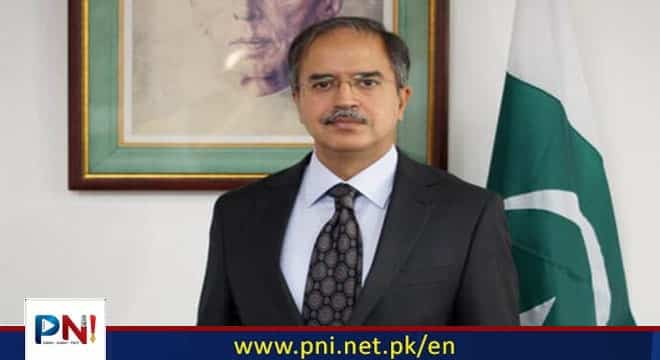UNITED NATIONS, Apr 09 : Pakistan has drawn the global community’s attention to the increased security threats posed by the proliferation of military AI technologies, particularly autonomous weapons, warning that their use could trigger new arms races and destabilize global and regional security.
Pakistan’s Permanent Representative to the UN Ambassador Asim Iftikhar Ahmad, in his national statement during the General Debate of the United Nations Disarmament Commission 2025, stressed the need to prevent AI from fueling an arms race, which could threaten global peace and security.
“The scale and novelty of AI’s military implications require a multifaceted, holistic and multilateral response. We believe that the United Nations should play a central role in international response to challenges associated with AI in military domain,” he stated.
Ambassador Asim said that the use of AI in the military domain presents security, operational, technical, ethical, normative, and legal challenges, particularly concerning compliance with International Humanitarian Law.
He advocated prioritizing the consolidation of the efforts over selective approaches and fragmentation, adding that the United Nations provides the best universal platform for these discussions to ensure legitimacy and inclusivity with equitable participation of all Member States.
Recalling the First Special Session of the General Assembly devoted to Disarmament (SSOD-I) in 1978, he stated that nuclear disarmament remains the highest priority of the UN Disarmament Commission since its inception.
The Pakistan UN envoy, however, noted a clear lack of progress on nuclear disarmament. He said that on the other hand, hundreds of billions of dollars are being committed to nuclear modernization programs. He added that we are witnessing unprecedented increase in military spending in recent memory, fueling ever-increasing arms race, which is now turbocharged by technological advancements.
Ambassador Asim underscored Pakistan’s deep concern on the discriminatory policies followed by certain countries in the nuclear domain.
He added that resultantly “the global security environment continues to deteriorate. The relentless pursuit of power and geopolitical competition has intensified in recent years, taking us further away from this important international priority.”
He said that it is more relevant than ever before to reaffirm our commitment to the foundational goals of nuclear disarmament.
He also shared Pakistan’s perspective to accomplish the goal, reaffirming the core principle of states enjoying equal and undiminished security under arms control frameworks; renewed efforts by the nuclear-armed states to fulfilling their legal and political obligations and guarantee for the protection of non-nuclear states from nuclear threats through a universal, unconditional, and legally binding treaty.
He also called for balanced reductions in conventional forces as conventional arms buildups contribute to nuclear risks, besides addressing underlying motives—such as perceived threats, power imbalances, and unresolved conflicts—that compel states to pursue weapons for self-defense.
Ambassador Asim reaffirmed Pakistan’s constructive engagement with the work of the UN Disarmament Commission.
At the start of the 2025 annual meeting of the UN Disarmament Commission (UNDC) on 7th April, Ambassador Usman Iqbal Jadoon, Deputy Permanent Representative of Pakistan to the UN in New York, handed over the chairmanship of the Commission to a representative of Paraguay.
He led the UNDC for the last one year and chaired its three week long substantive session in April 2024.
Follow the PNI Facebook page for the latest news and updates.









